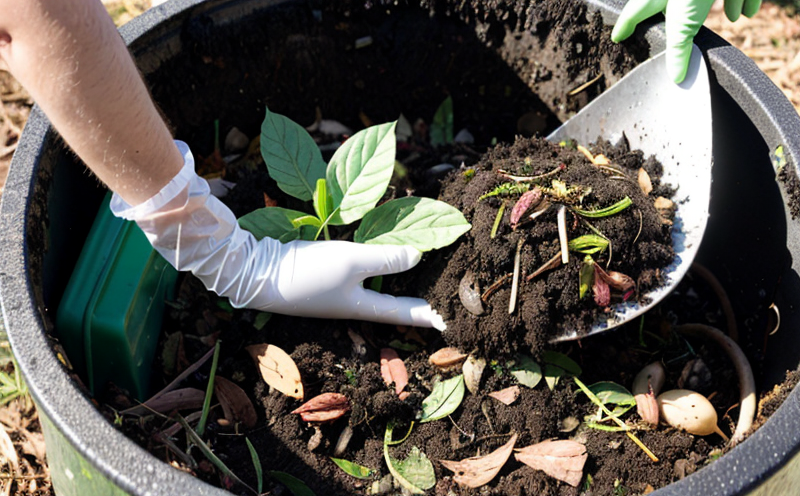ISO 17621 Dehydrogenase Activity Testing in Compost Microbes
The ISO 17621 dehydrogenase activity test is a crucial component of waste management and compost quality control. This standard provides the methodology for determining the microbial activity within compost through quantifying the dehydrogenase enzyme's role in cellular respiration. Understanding this enzymatic activity helps ensure that the composting process is effective, leading to nutrient-rich soil amendments.
The test involves isolating and culturing specific microbes from compost samples under controlled conditions. The dehydrogenase enzyme is then extracted and its activity measured by monitoring its catalytic conversion of a substrate into an oxidized form. This reaction produces measurable products that reflect the metabolic capacity of the microorganisms present.
The significance of this test extends beyond just quality assurance; it plays a pivotal role in environmental sustainability. By ensuring that compost microbes are active and functional, we can enhance soil health, reduce greenhouse gas emissions from landfills, and promote sustainable agriculture practices.
Composting is an environmentally friendly process that involves the breakdown of organic materials into stable humus through microbial action. The dehydrogenase enzyme is one of many enzymes involved in this process, particularly in breaking down complex carbohydrates and releasing energy for microbial growth. Measuring its activity allows us to assess the efficiency of composting operations at various stages.
One key aspect of this testing method is the ability to differentiate between active and dormant microbes. Dormant cells can still be present in a compost sample but may not contribute significantly to nutrient release or soil amendment properties. By identifying which microbes are actively metabolizing, we can optimize composting processes for greater efficiency.
The standard specifies precise protocols for preparing samples, extracting enzymes, and measuring activity. These procedures ensure consistency across different laboratories and enable accurate comparisons of microbial activity between samples from various sources or conditions.
Another important consideration is the environmental impact of these tests. The ISO 17621 protocol minimizes waste generation during testing by using minimal amounts of reagents and ensuring that all materials are disposed of according to strict environmental regulations. This aligns with broader sustainability goals in both laboratory practices and composting processes.
The test results provide valuable insights into the microbial community structure within compost, helping researchers and industry professionals make informed decisions about process optimization and product quality assurance. Understanding which microbes are active allows for targeted interventions to enhance specific aspects of the composting process, such as speeding up decomposition rates or improving nutrient availability.
- Active microbial communities lead to faster breakdown of waste materials.
- Dormant microbes may require different environmental conditions to become active.
Applied Standards
The ISO 17621 standard is widely recognized and used globally for its accuracy and reliability in measuring dehydrogenase activity. This international standard ensures consistency across different laboratories, which is essential for validating results and facilitating comparisons between various compost samples or processes.The protocol outlined in ISO 17621 provides detailed instructions on sample preparation, enzyme extraction, and measurement techniques to ensure accurate quantification of microbial activity.
- ISO 17621 specifies the use of specific substrates for dehydrogenase activity testing.
- The standard outlines precise conditions for maintaining optimal growth of microbes during sample preparation.
- Absence of inhibitors in the test environment is crucial to obtain valid results.
Customer Impact and Satisfaction
Implementing ISO 17621 dehydrogenase activity testing brings significant benefits to customers involved in waste management, environmental conservation, and sustainable agriculture. Here are some key impacts:- Better Quality Control: Ensures consistent compost quality by identifying active microbial communities that contribute positively to nutrient release.
- Environmental Compliance: Helps companies meet regulatory requirements related to waste management and environmental protection.
- Sustainable Practices: Promotes recycling and reduces landfill use, contributing to a greener footprint.
- Innovation: Supports ongoing research into improving composting techniques and understanding microbial roles in decomposition processes.
Competitive Advantage and Market Impact
Adopting ISO 17621 dehydrogenase activity testing offers significant competitive advantages for businesses operating within the waste management sector. By ensuring superior compost quality, these companies can differentiate themselves in a crowded market:- Enhanced Brand Reputation: Customers value products that are proven to be environmentally friendly and effective.
- Premium Pricing: Higher-quality composts command premium prices due to their superior performance and environmental credentials.
- Innovation Leadership: Early adoption of advanced testing methods positions companies as leaders in sustainability technology.





